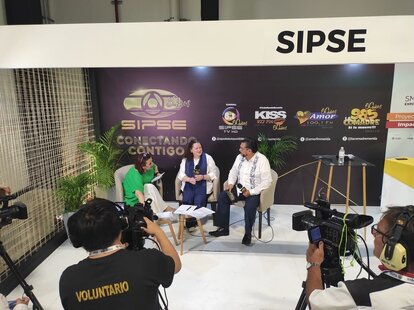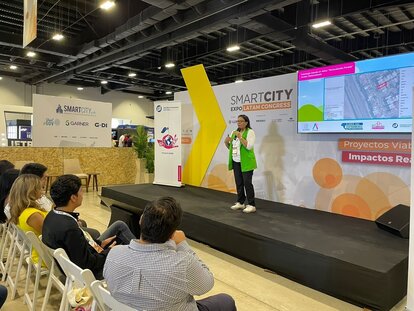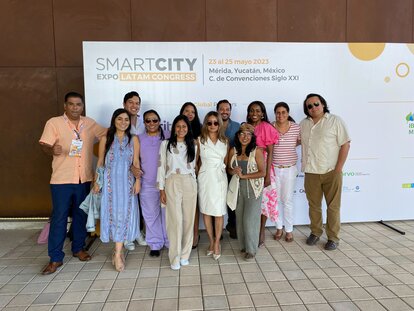Smart Cities
Intelligent Mobility: towards a philosophy beyond the means of transport

The way and ease with which people move about in their day-to-day lives is one of the most important aspects of city life, because it defines how enjoyable or how insufferable it is to live in a city. From the perspective of the Friedrich Naumann Foundation's Smart Cities Handbook (spanish), mobility must be person-centered, i.e., citizens as users. Therefore, from our perspective, a smart city is one with intelligent mobility plans and strategies that minimize time, as people's most precious resource, the costs of daily commuting, as well as energy and the effects generated by transportation emissions.
City Experiences in Mexico, Guatemala and Honduras
At the Foundation, we held an annual meeting with the members of the Mexico-Central America Smart Cities Network during the Expo Latam Smart Cities in Merida, Yucatan. This year, the focus of the expo was mobility.
Among the members of the network, the cities of Guatemala and Mixco have been developing and implementing projects in this area for years, with great experiences in transportation management and bicycle lanes. Similarly, Chihuahua has managed to improve people's quality of life by implementing Google Transit to the transportation network. Many others, such as Visor Urbano, a program implemented in Jalisco, as well as the state of Hidalgo and the municipality of Puerto Cortes, Honduras have focused their efforts on the digitalization of procedures, helping to reduce emissions by preventing people from having to travel to apply for a procedure or license. In Irapuato, Guanajuato and Antigua, Guatemala, advances in land-use planning are encouraging the creation of mixed land uses that lead to more walkable neighborhoods. In the north of Mexico, in Tecate, the implementation of projects such as linear parks to prevent flooding also promote people to have a public recreational space.
All these initiatives are examples to understand that mobility goes beyond transportation. Successful mobility lies in intelligent urban planning that is accompanied by all these initiatives that allow citizens to have a better quality of life.

III Encuentro de la Red de Ciudades Inteligentes de México y Centroamérica de la Fundación Friedrich Naumann
© Fundación Friedrich NaumannCurrently many cities are changing, but we still have a model that privileges mobility based on the three C's: car, shopping center and horizontal condominiums. These models arose as a result of urban growth and increased insecurity; however, what they promote is greater alienation and emissions.
The financial cost of this model is excessive and of very little functionality, but, above all, it is contrary to what is required to make a street more walkable and a city more efficient. A model based on vertical urban growth, with mixed land uses, generates smart neighborhoods by focusing on walkability and fostering a sense of community and exchange among neighbors.
Smart cities have begun to redesign their streets to favor pedestrian mobility, non-motorized mobility and mass transit. In addition to better layout and connectivity, this is achieved with: wide, safe, continuous, tree-lined sidewalks with safe and frequent crosswalks, fewer lanes for cars, and a higher proportion of bike lanes as well as bike lanes and pedestrian crosswalks.
of bicycle lanes as well as mass transit lanes.

III Encuentro de la Red de Ciudades Inteligentes de México y Centroamérica de la Fundación Friedrich Naumann
© Fundación Friedrich NaumannHow to understand mobility from a liberal perspective?
Mobility policies are implemented by the government, which could be understood as contrary to the skepticism of liberalism towards the concentration of power. However, we must consider that liberalism also seeks a rule of law that establishes equal rules of the game for all people through institutions that act as arbitrators, and this work is not exclusive to the authorities.
It is imperative that in Mexico and Central America we understand that initiatives for our cities should not come exclusively from the public administration. Civil society, that is, organized individuals and entrepreneurs play a key role in identifying the real needs, identifying the problems to be improved and co-creating solutions.
In this sense, it is crucial to understand that a key component of smart cities and mobility is accessibility. We must ask ourselves how affordable a service or certain transport is. For this, an open economy without barriers to entry for new companies is crucial because in this way, ventures and companies for clean energy, transportation or real estate for street improvement, can increase and diversify the supply of services, reducing prices in the market. As there are more competitors and suppliers, a city becomes much more accessible.
Mobility, conceived as transportation options, must focus on users. The digitization of mobility through the management of transportation systems can improve safety, avoid traffic congestion and reduce energy consumption. Mobility governance should ensure sustainable transportation planning and development that considers the needs of users, as well as environmental, social and economic requirements. However, it is necessary to understand mobility as a much broader component than the means of transportation, because as has been shown through the good practices of the members of the Foundation's Smart Cities Network, there are many other urban planning initiatives that also influence better mobility.

Fotografía grupal en el III Encuentro de la Red de Ciudades Inteligentes de México y Centroamérica de la Fundación Friedrich Naumann
© Fundación Friedrich Naumann México y Centroamérica